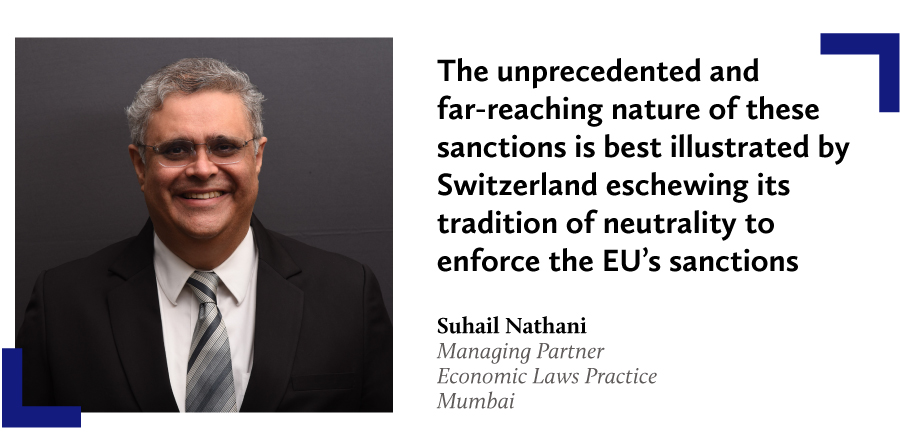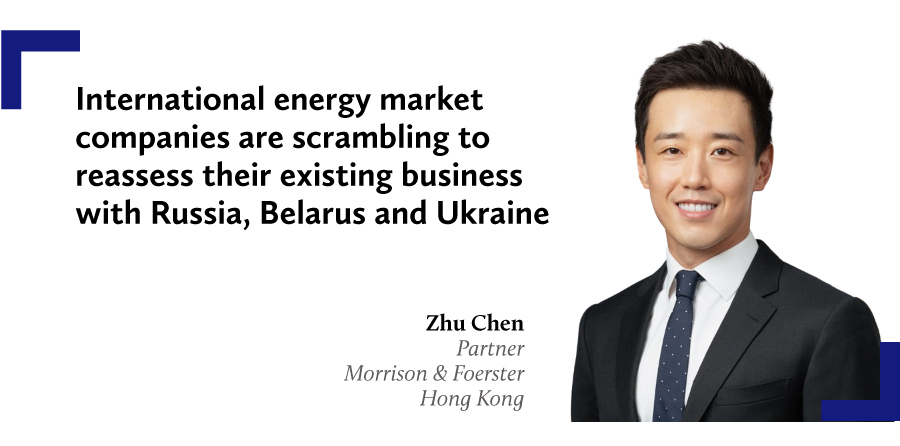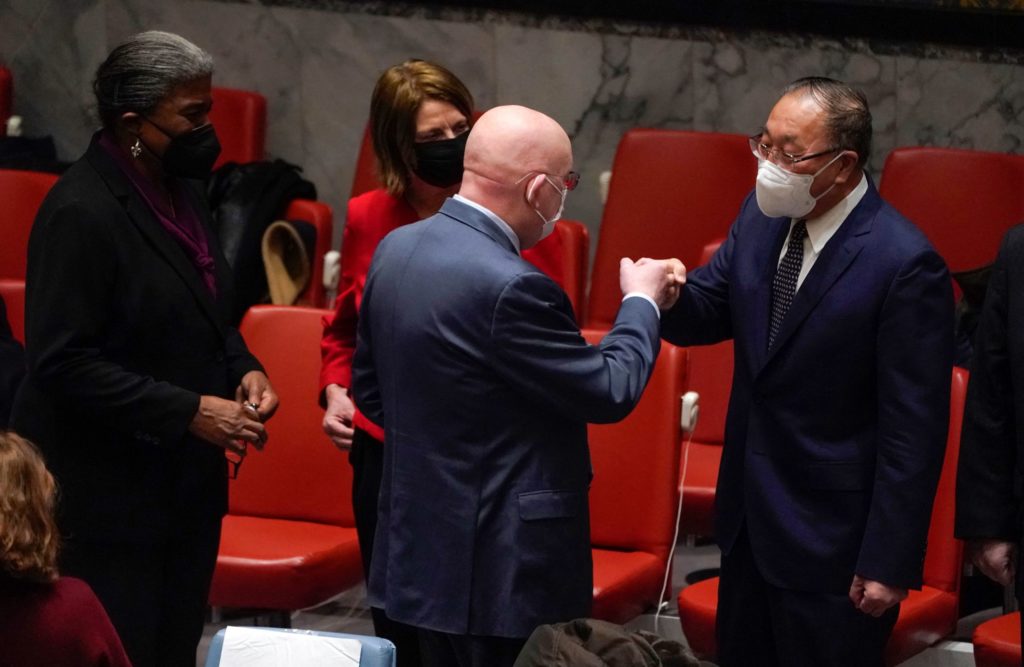As Russia’s invasion of Ukraine continues, the international legal community has condemned Vladimir Putin’s regime not just with words, but by boycotting Russian business and transactions. George W Russell explores the ramifications
On 3 March, Allen & Overy said it would review its Russia portfolio. “As a result, we will refuse new instructions and stop all Russia-linked work that goes against our values,” the firm wrote in a LinkedIn post. “We support and encourage the international community in bringing pressure to bear to end this brutal conflict.”
The firm followed in the footsteps of Linklaters, which said it would “wind down” its operations in Russia and close the Moscow office. “We will not act for individuals or entities that are controlled by, or under the influence of, the Russian state, or connected with the current Russian regime, wherever they are in the world,” the firm said in a statement.
Mannheimer Swartling has ceased its work with Russian clients and relocated all its Swedish lawyers based in Moscow ahead of plans to exit the market altogether. According to the Swedish firm, Russian operations are “suspended”, and it has stopped accepting any work on behalf of Russian clients in any of its offices.
White & Case and Sidley Austin have also dropped Russian clients. Other firms said they were taking a look at their Russia-related work. “Baker McKenzie is reviewing and adjusting our Russia-related operations and client work to align with all applicable sanctions and comply with these fast-evolving laws,” says a spokeswoman for the firm in Hong Kong.
The exits from Russia come after many firms were forced to close their Ukraine offices as Russian forces attacked. Baker McKenzie says it will shut its Kyiv office until the situation stabilises. “We are closely monitoring developments at all times and are doing everything possible to support our people during these challenging circumstances,” says the spokeswoman.
CMS says it has not only closed its Kyiv office, but has helped some of its employees move from Ukraine to EU countries. “Although our communication lines remain open, we have made the decision to close our Kyiv office until further notice,” says a spokesman. For UK law firm Kennedys, the invasion accelerated its departure. Global senior partner Nick Thomas in London says the firm has been winding down its Moscow office.
The actions followed a strong reaction from the global legal community. “This act by Putin is a watershed moment that indisputably violates international law,” said International Bar Association (IBA) president Sternford Moyo. “The IBA, founded to protect and promote the rule of law, strongly condemns Russia’s invasion of Ukraine.”
Some firms were digging in. Dentons says its Kyiv office is fully operational but the firm is reviewing its future if the danger increases. Other firms with significant offices in Kyiv are also making contingency plans. Laura Brank, managing partner and head of the Russia practice at Dechert in Moscow, told the New York Law Journal: “Nobody at this stage is thinking we’ve got to leave the market.”
Meanwhile Eversheds Sutherland and Gowling WLG were announcing closure of their offices in Russia, along with Latham & Watkins, Freshfields Bruckhaus Deringer and Squire Patton Boggs in a flurry of international firm departures as the conflict intensified.
For Ukrainian law firms, fleeing is not an option in many cases. The Ukrainian Bar Association (UBA) says Russia’s invasion violates a number of international treaties. “The legal community in Ukraine is united around the idea that in the 21st century the rule of law should prevail over ‘the law of the jungle’, and military force should not be the only thing preventing one country from wolfing down another,” a UBA statement says.
Individual law firms are defiant. Arzinger, a top Kyiv legal outfit, says it will not offer “co-operation, partnership, and providing any services to Russian companies”, adding: “We also urge all Ukrainian and foreign corporations, our international partners and clients not to support the business of the aggressor country.”
The website of Vasil Kisil & Partners, another major firm in Kyiv, declares: “Zero tolerance to Russian business.” Andriy Stelmashchuk, the firm’s managing partner, wrote on LinkedIn: “While the Ukrainian armed forces are fighting the enemy, all of us, the Ukrainians, must provide a strong support in the rear.”
Other firms have messages of defiance. LinkedIn posts include taunts and insults against the invaders – some lawyers have called out their Russian counterparts, while others say they have disconnected or “unfriended” pro-Putin peers.
 The hammer of sanctions
The hammer of sanctions
Less than a month before the invasion, Ukraine’s independent central bank forecast that the country’s USD180 billion economy would grow 3.4{e421c4d081ed1e1efd2d9b9e397159b409f6f1af1639f2363bfecd2822ec732a} this year. The World Bank has committed USD7.9 billion to help develop Ukraine’s economy since 2014. That money has helped the country institute wide-ranging economic reforms, including privatisations in the energy and banking sectors, as well as efforts to make its farmland more productive.
Putin’s resentment at Ukraine has simmered since 2014, when the pro-Moscow government of Viktor Yanukovych was removed and replaced by a pro-Western administration. The overthrow of an ally and the emergence of an unsympathetic government in Kyiv had played a part in the February invasion.
War means “a catastrophic impact for our economy, for the region overall”, Alex Rodnyansky, a Cambridge University assistant professor and economic adviser to Ukrainian President Volodymyr Zelensky in Kyiv, told the BBC.
While Russia expected sanctions in the wake of its invasion, officials were surprised at the scope and range of the repercussions. “We were ready for sanctions but did not expect that they would affect athletes, intellectuals, actors and journalists,” Russian Foreign Minister Sergey Lavrov was quoted by Al Jazeera as saying. Lavrov would have been shocked to find that the sanctions would go even further.
“I don’t think the Russian government was expecting the EU, US, UK and a number of other countries to agree to freeze assets of the Russian central bank – almost half a trillion dollars held around the world,” says John Smith, partner and co-head of Morrison & Foerster’s national security group in Washington.
Smith observes that seven of Russia’s largest banks have been disconnected from the Society for Worldwide Interbank Financial Telecommunications (SWIFT) international messaging system, a vast network of banks and other financial institutions to quickly and securely send and receive information, such as money transfer instructions.
“That’s why you’re seeing a staggering impact on the Russian economy,” he says. “Flight restrictions aren’t typical sanctions, but they’re having an effect,” he adds. “Russian flights cannot go over many jurisdictions, so travel and transit are restricted significantly, but flight paths are now longer, and that also costs Russian airlines a lot more to operate on a day in and day out basis.”
Lawyers note there has been significant sanctions fallout in Russia. “It has been severe and wide-ranging,” says Zhu Chen, a partner in Morrison & Foerster’s national security group in Hong Kong. “Stocks have fallen by up to 90{e421c4d081ed1e1efd2d9b9e397159b409f6f1af1639f2363bfecd2822ec732a} and the Moscow stock exchange has been closed for several days. Also, international energy market companies are scrambling to reassess their existing business with Russia, Belarus and Ukraine.”
The horror of the attack on Ukraine galvanised a number of nations, such as Singapore, that are usually averse to sanctions. “Indeed, the unprecedented and far-reaching nature of these sanctions is best illustrated by Switzerland eschewing its tradition of neutrality to enforce the EU’s sanctions,” wrote Suhail Nathani, managing partner at Economic Laws Practice (ELP) in Mumbai.
Huge range of transactions
The invasion and subsequent sanctions have thrown into chaos the work of international law firms that have invested in Ukraine since its independence in 1991, after the collapse of the Soviet Union.
Some firms, like Clifford Chance, arrived that year. The firm’s name office closed in 2015, but it retains a best-friends relationship with Kyiv-based Redcliffe Partners. Baker McKenzie and Salans arrived in 1992, drawn by the country’s relative stability, abundant resources and steady economic growth.
For law firms, Ukraine has provided a huge range of transactions and cases as the economy has modernised. Baker McKenzie’s Kyiv office, for example, advised IKEA, the Swedish multinational conglomerate, on the launch of its first store in Ukraine. For its part, Dentons has advised on Eurobond issuances by Ukrainian entities, represented a Russian investment bank in its acquisition, and assisted a global lender over a stake in a Ukrainian manufacturer.
“To the extent feasible, our partners are working with clients affected to determine the options for continuing to provide legal assistance elsewhere, and we are providing further support through our network of offices across Europe,” Nadiya Nychay, a Dentons partner in Brussels, and her colleagues wrote.
As well as disrupting Ukrainian business, sanctions have closed down opportunities in Russia. For example, EU regulation 2022/328 introduced broad new sanctions on Russian airlines and the Russian aviation sector, including aviation insurance and related activities, entities and persons. Other rulings target banks, oil companies and insurers.
Compliance specialists are much in demand due to the sanctions. “Multinational companies that have Russian affiliates, operate in Russia, or otherwise conduct business with Russian parties should immediate familiarise themselves with these new restrictions,” Gregory Husisian, a partner at Foley & Lardner in Washington, wrote on the firm’s blog.
Zhu, at Morrison and Foerster, says: “We are working on a number of matters where companies are getting their compliance up to speed.”
For clients, an initial key question is which sanctions regimes and regulators are relevant to their business. “The main ways businesses can be exposed to sanctions are through territorial presence, products and services, and employees and business partners,” according to a client note by Stephanie Brown Cripps, counsel at Freshfields Bruckhaus Deringer in New York.
“Knowing the full range of products and services your business sources and provides, as well as their applications, will help you identify potential exposure, particularly if sanctions or export control restrictions are imposed on certain types, categories or applications of products,” she said. “Understanding your end-customers will also be important, as both sanctions and export controls can turn on end-users and end-uses.”
Sanctions affect individuals as well as companies and government entities. For example, curbs have been placed on several Russian oligarchs and their families. “For the wealth management industry, the challenge is somewhat different because they may be holding the assets of sanctioned persons, interests in sanctioned entities, or in businesses engaged in sanctioned activities,” Samantha Bradley, a wealth management lawyer at Ravenscroft & Schmierer in Hong Kong, told Asia Business Law Journal.
“They may be unable to exit the relationship and may have to consider whether to exercise powers to change the management of underlying entities to gain control of entities,” she adds. “Wide adverse press reporting against various sanctioned persons, and the risk of undisclosed arrangements, may in some cases necessitate the review of due diligence held on file for anti-money laundering and counter-terrorist financing.”
Asia-Pacific law firms are likely to be greatly affected. Australia, New Zealand, Japan and South Korea have joined in actions against Moscow, while Singapore, in a rare move, issued its own separate sanctions on Russia after joining the first round of international curbs. “Given the global flow of trade and investment these [sanctions] will have pervasive trade ramifications across the globe,” observes Ambarish Sathianathan, a partner at ELP in Mumbai.
Singapore announced further sanctions against Russia on 5 March, which included four banks and an export ban on electronics, computers and military items, in response to what it said was Moscow’s “dangerous precedent” in Ukraine. The tiny city-state, an international shipping hub, rarely imposes sanctions of its own, but said it would not allow export of items that could inflict harm on or subjugate Ukrainians, or help Russia launch cyber-attacks.
Nathanael Lin, a partner at Rajah and Tann in Singapore, told The Straits Times that the expansion of sanctions against Russia would add uncertainty to the energy market, and drive up oil and gas prices. He says that some commodity traders may be unable to access funds, adding: “Banks will therefore be watching traders’ liquidity positions very closely.”
Sanctions creep closer to Beijing
China has been the largest and most influential country opposed to sanctions. Guo Shuqing, chairman of the China Banking and Insurance Regulatory Commission, reportedly said at a news conference in Beijing on 2 March: “As far as financial sanctions are concerned, we do not approve of these, especially the unilaterally launched sanctions, because they do not work well and have no legal grounds.” Beijing strongly hinted that it would be business as usual.
China and Russia issued their joint statement on 4 February, indicating that the “friendship between the two states has no limits, and there are no ‘forbidden’ areas of co-operation”. As a result, neither China, nor Hong Kong and Macau, have imposed unilateral sanctions. A foreign ministry spokesman said China and Russia would “continue to carry out normal trade co-operation in the spirit of mutual respect, equality and mutual benefit”.
However, the US has now indicated that should China seek to evade the sanctions, there will be consequences. The South China Morning Post on 3 March quoted the US Department of State counsellor Derek Chollet as saying: “China, if it were to seek to evade the sanctions, or somehow dividing the sanctions, they would be vulnerable.” He added: “Any country that tries to evade these sanctions will also face the consequences of its actions. I don’t want to speculate what that would be.”
Bradley, at Ravenscroft & Schmierer, says: “It seems likely, therefore, that the sanctions will be having a deleterious impact for many investors and businesses in the region doing business with Russia, or with sanctioned persons. The sanctions are also relevant considerations for our wealth management industry and legal community in Hong Kong, to the extent it may be administering assets for, or interests in, sanctioned persons, and providing related legal advice.”
Bradley says the lack of local sanctions presents commercial risks for Hong Kong businesses that may have binding contracts for delivery of goods or services, or hold assets of sanctioned persons. “They are faced with the competing priorities of avoiding penalties for non-performance of contracts and business interruption costs, or avoiding potential exposure to reputational damage and secondary sanctions if they perform existing commitments or enter into new commitments.”
In 2020, several Hong Kong companies were the subject of secondary US sanctions because of trade with Iran, Bradley notes. “Those subject to implementing primary sanctions normally have a wind-down period during which they have time to supply under contracts concluded before the sanction was incepted,” she says. “Traders in Asia concerned about the potential for secondary sanctions should have regard to these rules and review their contractual arrangements carefully.”
While India’s involvement in the crisis has been limited so far, the rising rate of sanctions could be a cause for concern, given Russia’s importance as a military and economic partner. Russian defence contractors have been strategically important military partners, and their ability to continue supplying to India could be curtailed. “There are concerns that this could constrain the ability of these suppliers to fulfil existing contracts to India, such as the S-400 and stealth frigates among others,” ELP’s Sathianathan notes.
India is the world’s third-largest importer of oil and has consistently looked to source crude from Russia. There is also a two-fold impact on the steel sector as India has been looking to diversify its coking coal imports. Russia and Ukraine are estimated to account for 10{e421c4d081ed1e1efd2d9b9e397159b409f6f1af1639f2363bfecd2822ec732a} of the world’s steel trade. “With potential supply disruptions on account of the war and sanctions, there could be a greater demand for Indian steel,” says Sathianathan.
Russia and Ukraine are both key sources in the automotive industry’s supply chain, particularly for semiconductor manufacturing, as they provide critical gases and rare earth metals. Russia is also one of the largest exporters of palladium, another key input for auto parts manufacturers.
In the meantime, the Indian government is also expected to undertake mitigating measures to protect trade with Russia. Indian banks also continue to await directions from the government on how to deal with Russian banks and related transfers. However, South Asia’s biggest lender, the State Bank of India, has announced that it would not process any transactions involving Russian entities, subject to international sanctions.
Amid the economic and legal confusion, a human tragedy is unfolding in Ukraine, and much of the suffering as a result of sanctions is likely to fall on ordinary Russians, many of whom have no stake in, and do not support, Putin’s war. “The Ukrainian people have shown extraordinary resolve and bravery in the face of appalling attacks,” Allen & Overy said in its statement that it would review its Russian portfolio. “Our thoughts are with them.”


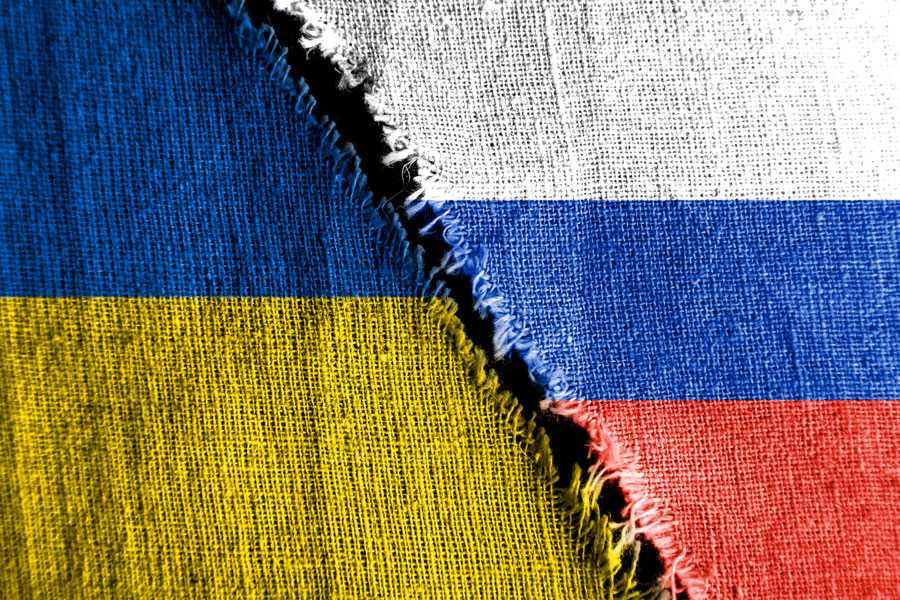
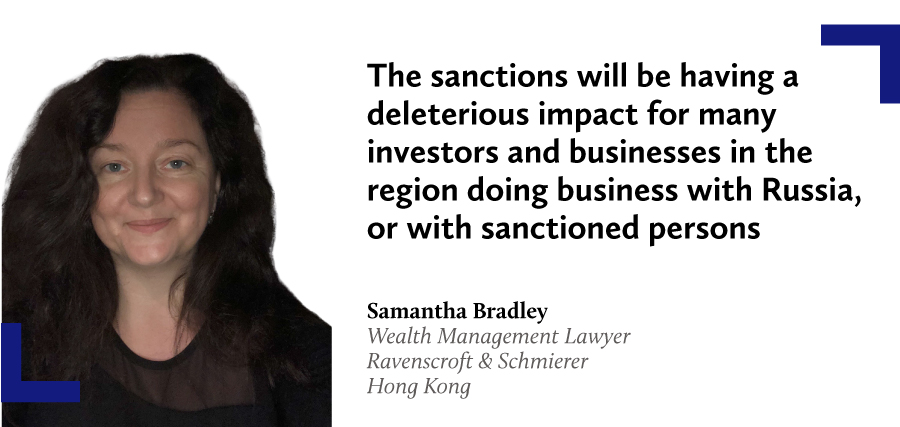
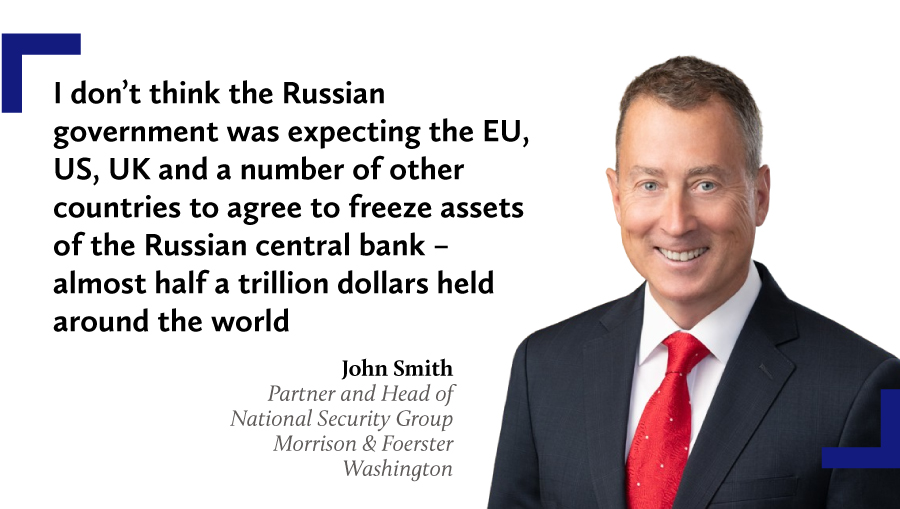 The hammer of sanctions
The hammer of sanctions